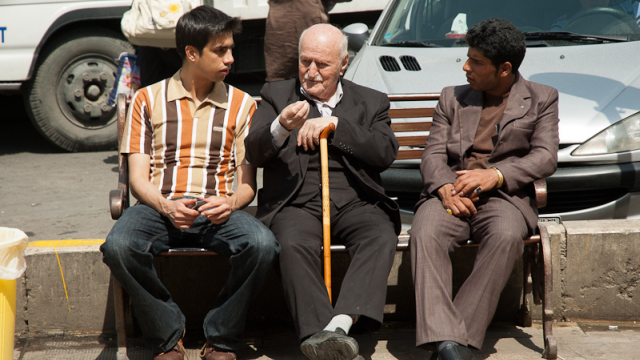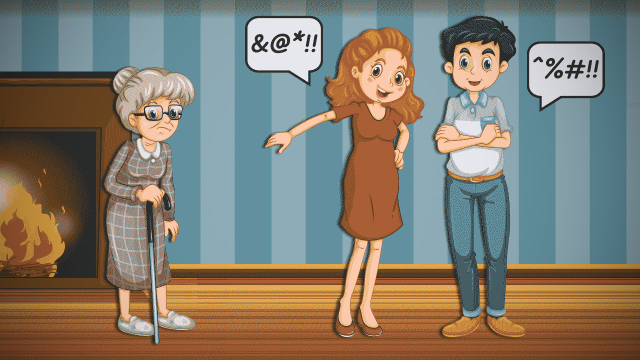Effective communication requires you to tailor your message to your audience. When it comes to older adults, many of us tend to treat them like children or invalids. Here are the most common mistakes we all make, and how you can avoid them.
Pictures: Matthew Cole (ShutterStock), YODesigner, Kamyar Adl, Nathan O’Nions
We Treat Them Differently Just Because They’re Old

Age comes with a lot of stereotypes, and we often fall prey to them. For example, we have a tendency to address seniors with patronising language, unnecessarily simplified words or voice modulations that we’d use with children. For example, we might use “sweetie” or “dear” or talk in a high-pitched voice. Such “elderspeak” is usually taken as an insult. It seems obvious, but you might not even realise you do it.
In its guide “Communicating With Older Adults“, The Gerontological Society of America (GSA) also says you don’t need to change your vocabulary to use simplified words:
As a general rule, older adults maintain their existing vocabulary or continue to improve it. They have no greater problem understanding complicated words than do members of other age groups, so there is no need to simplify the words you use.
Seniors also often complain that people talk to them loudly for no apparent reason. Not every old person suffers from hearing loss. So enunciate well and speak at your normal volume. If they ask you to repeat something you said, don’t think it’s an invitation to yell it out. My own grandmother put it best when she mildly scolded me for this:
Just because I ask you to repeat yourself, you don’t need to start talking at a louder volume. I can hear just fine, but just like you miss words sometimes, so do I.
Most importantly, talk to them directly. When meeting an older adult, have you ever asked someone else in the room, “So how is he/she doing today?” Turns out that’s one thing most elderly people take offence to (go figure), as the Ageing & Communications: Engaging Older People guide points out:
“It is downright humiliating when the health care provider says to my daughter — “And what are “WE” here for today?” — ASK ME! You obviously see me sitting here.” — Emma, age 81.
We Don’t Adapt To The Issues They Do Have

Old age can bring some complications, of course, but you should know which ones are affecting the person in question. More importantly, know the fine line between being patronizing towards those and accommodating their issues respectfully.
A good example: Many of us ignore changes in the environment. Just like background noises, harsh lighting or anything else affects you, it affects older adults too, and often to a larger degree. But the reason your grandma could hear you the last time and not this time is not “She’s just getting old!” That leap in logic is how you fall into the trap of talking loudly or patronizing them.
Just be more sensitive towards changes. Seniors will adjust too, they just take a little longer, so don’t be an impatient jerk and jump to conclusions. You can also help with a few thoughtful gestures to make the transition easier and faster. For example, the Cleveland Clinic suggests that it’s a good idea to ensure they can see your lips clearly:
Avoid covering or changing the shape of your lips and mouth. Most listeners make use of lip-reading. Lip-reading helps improve recognition of some sounds and speech that are more difficult and especially in difficult listening situations.
Similarly, if the person you’re talking to has a bad working memory, break down your sentences when conveying important information. The GSA gives an example of such rephrasing:
Original: You have arthritis of the hip which is making it painful for you to walk and may eventually require hip replacement surgery if we cannot control your pain with medications.
Broken Down: You have arthritis of the hip. The arthritis is causing pain when you walk. Taking medication should help to control your pain. If the pain continues, we might need to consider hip replacement surgery.
With some people, it may also a good idea to use visual aids.Imagination can take a hit along with short-term memory as we get older. If they aren’t following your detailed descriptions of your trip, whip out that smartphone and show photos of your holiday. While those descriptions will still get your point across, why would you want to task someone when there’s a more effective way of communicating?
You should also be aware of any physical or mental disorders and act accordingly. For instance, with a patient suffering from dementia or any disorder that affects their thinking, make things easier by asking specific questions instead of open-ended ones. For example, “Would you like soup or sandwich for lunch?” narrows their answer than “What would you like for lunch?” Open-ended questions are fine in conversation though — just avoid something that taps into episodic memory, such as “What did you have for lunch yesterday?”
We Forget They Are People — People We Can Learn From

Somehow, we end up forgetting that the older person is, in fact, a person. They have the same thoughts and feelings that you do. Old people feel like eating their favourite food, old people can kick your butt at chess, and old people can have the same sexual desires as you. Yet we treat them differently because of our flawed notion of what age does to a person.
Realise that it’s just another person in an older body. Think of what you would feel like if you, right now, were put in an older body and people started treating you differently. Not a nice picture, is it? Treat a senior like how you would eventually like to be treated, and you will have a much better experience for the both of you.
The more you realise that everyone’s “just another person” like you, the more easily you can connect with them. You’ll find that they too have been through all the experiences you have — and a lot more. Your grandfather got his heart broken, your grandmother struggled with finances, and they lived through it all to tell the tale. Tap into that wisdom they have gathered over the years, get them to share their stories, just talk! Our elders are like a Wikipedia of life lessons that you can learn from, so take advantage instead of writing them off.

Comments